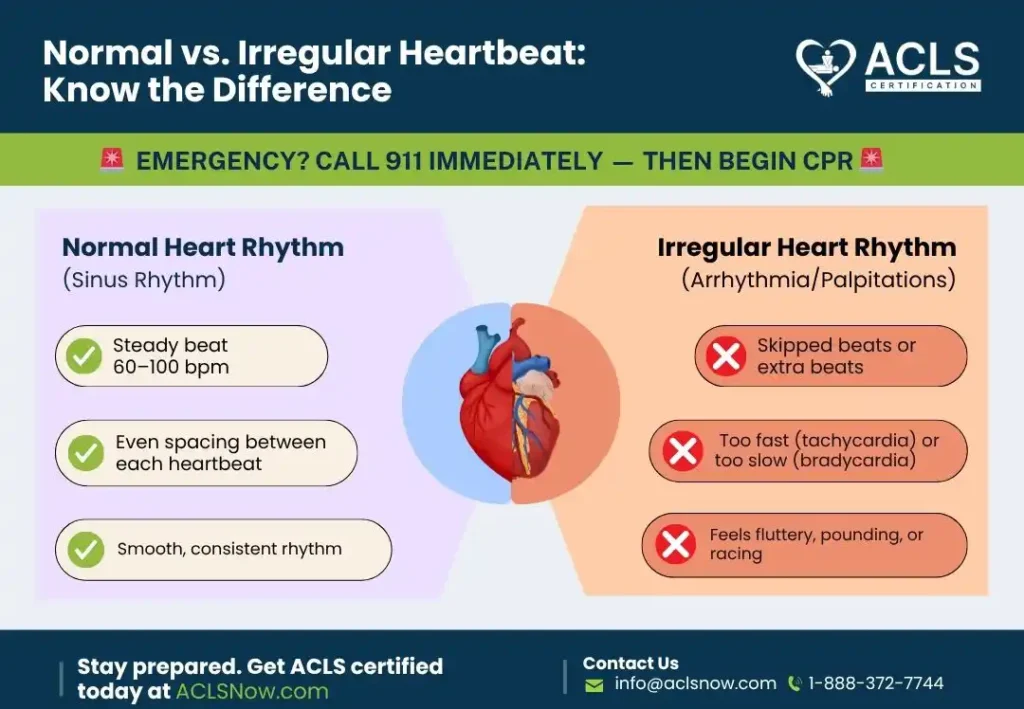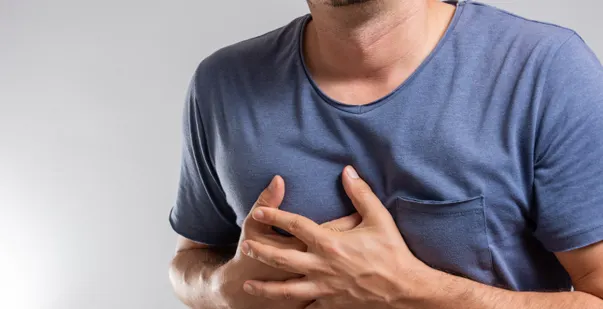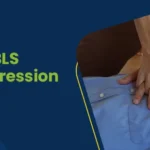Heart palpitations are when you feel as if your heart is racing or just skipped a beat. Though 6 to 11% of people report experiencing the condition, it can be a concerning and uncomfortable experience.
The sensation of a rapid heartbeat can make you anxious and worried about your overall health. Let’s explore more about heart palpitations, including their symptoms, causes, and treatment!
Master ACLS Now
Get ACLS certified with confidence
What are Heart Palpitations?

Heart palpitations are sensations where you can abnormally feel an irregular heartbeat. A normal heart rate is usually between 60 and 100 beats per minute. Usually, the condition is not serious, and it goes away on its own. However, in certain cases, it can be benign, as an indication of some severe health problem.
During the episodes of palpitations, you might feel your heart beating fast but not hard, even in your chest, neck, or throat. Palpitations are simply a heightened awareness of your heartbeat. This heightened awareness may indicate a change in your heartbeat, which is often normal and doesn’t signify any health issues.
However, sometimes heart palpitations occur due to arrhythmia, where your heartbeat is faster or slower than normal, indicating an irregular pattern. Some signs to watch for may indicate an underlying medical condition, which could increase the risk of stroke or other cardiac events.
Some types of heart palpitations include,
- Premature Atrial and Ventricular Contraction
- Atrial Fibrillation (AFib)
- Supraventricular Tachycardia (SVT)
- Ventricular Tachycardia (VT)
- Atrial Flutter
- Sinus Tachycardia
- Sinus Bradycardia
What Causes Heart Palpitations?
Most people wonder if it is normal to feel your heartbeat while resting. Palpitations may occur anytime, even while you’re sleeping or going about your daily routine. While palpitations can be signs of cardiac disorders in extreme circumstances, they are usually due to lifestyle choices. Let us explore some common causes of heart palpitations.
Thyroid Issues
The thyroid is responsible for the proper regulation of hormones. If you experience thyroid hormone imbalances due to an overactive (hyperthyroid) or underactive (hypothyroid) thyroid gland, these hormonal fluctuations can result in frequent flutters in your heart.
Smoking
Smoking is one of the leading causes of heart palpitations, as it elevates your heart rate and blood pressure due to the nicotine present in tobacco. Moreover, the sudden withdrawal of nicotine can cause palpitations as your body adjusts to the absence of the substance.
High-Stress Situations
Stressful situations can trigger your body to release hormones that induce a fight-or-flight response, which may increase your heart rate. This response can manifest in the form of panic attacks, irrational fears, and heart palpitations. It is not a sign of cardiac arrest and typically resolves once you calm down.
Caffeine
Caffeine is a powerful stimulant that increases heart rate. Avoid consuming too many cups of coffee or highly caffeinated drinks, especially if you feel jittery after a single serving. Excessive caffeine intake can result in heart flutters.
Hormonal Fluctuations
Women are more prone to heart palpitations during hormonal imbalances related to their period, pregnancy, or menopause. These palpitations are usually fleeting and should resolve once hormone levels stabilize.
High Fever
Your body tends to consume energy at a faster rate when you have a fever. This reaction, especially during high-temperature fevers, can induce palpitations due to spikes in your heart rate.
Vigorous Workouts
Intense workouts can make you gasp for breath as your heart struggles to pump excess oxygen-rich blood to the muscles. Therefore, it is common to experience heart palpitations if you have not engaged in a regular exercise routine.
Low Blood Sugar
Palpitations are also a common side effect of fasting, as your body releases stress hormones like adrenaline. This release provides your body with the energy needed to cope with a lack of food. A drop in blood sugar can lead to a higher heart rate due to the adrenaline coursing through your system.
What are the Symptoms of Heart Palpitations?
The sign of palpitations is a fluttering or hammering sensation in your chest, which might feel like your heart is racing, beating too hard, or skipping beats. Here are some common symptoms associated with the condition:
- Fluttering or racing heartbeat
- Pounding in the chest with a sensation of forceful heartbeats
- Skipped beats or extra beats
- Dizziness or lightheadedness
- Shortness of breath
- Chest pain or discomfort
- Sweating
- Fatigue
- Anxiety or panic
- Nausea or abdominal discomfort
When to Worry About Heart Palpitations?
While occasional palpitations are usually harmless and can be attributed to anxiety, it’s important to consult your healthcare provider if you are unsure about the underlying cause. It is time to worry if:
- You have heart palpitations for three days or more.
- Your episodes of palpitations are new or have changed in their pattern or intensity.
- You experience heart palpitations all day, accompanied by symptoms such as dizziness and fatigue.
- You have other related symptoms like chest pain, fainting, or shortness of breath.
- You have a medical history of heart disease or other cardiovascular conditions, such as bradycardia.
While the symptoms of anxiety and irregular heartbeat can be similar, don’t hesitate to voice your concerns. When left untreated, palpitations can lead to more serious health implications, such as heart failure or stroke. Getting evaluated in the early stages will help you begin your treatment sooner.
Read More: Cardiac Disease in the Young: Recognizing and Understanding Signs (aclsnow.com)
What are the Treatments for Heart Palpitations?
To receive proper treatment for your heart palpitations, keep a journal of when the episodes occur to identify common patterns or triggers. In clinical settings, your medical professional will monitor your heart and lungs while assessing your history, symptoms, and the medications you take. Some common treatment options for this condition include:
Lifestyle Changes
Making healthy lifestyle changes can help reduce episodes of palpitations. This includes managing stress through relaxation techniques like meditation or deep breathing, getting regular exercise, maintaining a healthy weight, and avoiding stimulants like caffeine.
Medications
In some cases, your healthcare professional may prescribe certain medications to control palpitations. These may include beta-blockers, calcium channel blockers, or anti-arrhythmic drugs. However, medications are typically used only when lifestyle changes are ineffective or if you are diagnosed with an underlying heart condition.
Implantable Devices
In rare circumstances, especially if your palpitations are due to arrhythmias like atrial fibrillation, implantable devices may be recommended. Pacemakers or implantable cardioverter-defibrillators (ICDs) may be suggested to regulate your heart’s rhythm.
Effective Management of Heart Palpitations
Heart palpitations are a prevalent condition affecting millions worldwide at least once in their lives. The fluttering or hammering sensation in the chest may feel alarming but is often harmless. Even though palpitations can be unsettling, they typically begin and resolve on their own. Understanding the symptoms, causes, and treatment options with proper ACLS training can help manage them effectively. If you find your symptoms persist, consult your healthcare professional to get an accurate diagnosis and timely treatment to restore your normal heart rate and rhythm.
FAQs
Are heart palpitations dangerous?
Palpations are not always dangerous. They may occur due to stress, caffeine or even dehydration. However, they might indicate an underlying cardiac issue if they happen frequently or are followed by shortness of breath, fainting, or chest pain.
Can anxiety or stress cause palpitations?
Indeed. Anxiety, panic attacks, or emotional stress can set off your body’s “fight-or-flight” reaction. It causes your heart to beat more quickly by releasing stress hormones. Once you relax, these palpitations usually stop. However, if they continue, speak with your physician.
How long do palpitations usually last?
Palpitations may last only a few seconds or for minutes. In most cases, they come and go quickly. Long-lasting episodes or daily occurrences need immediate attention from your doctor.
When should I see a doctor for palpitations?
If your palpitations are new or come with dizziness, fainting, chest tightness, or difficulty breathing, you should contact your doctor. Getting checked is always safer, particularly if you have a history of heart problems.
Can lifestyle changes help to reduce palpitations?
Yes. Reducing alcohol, nicotine, and caffeine use helps many people experience fewer palpitations. Staying hydrated, getting enough sleep, and practicing stress-busting techniques (yoga or deep breathing) are really effective.
References
- Heart Palpitations: Symptoms, Causes & Treatment
- Heart palpitations – Symptoms & causes – Mayo Clinic
- Heart palpitations Information | Mount Sinai – New York
- Heart Palpitations: Causes, Diagnosis, and Treatment
- What Causes Heart Palpitations and When Should You Worry?
- Heart palpitations – Diagnosis & treatment – Mayo Clinic
- Heart palpitations: MedlinePlus Medical Encyclopedia







